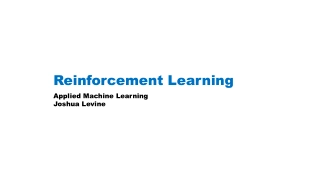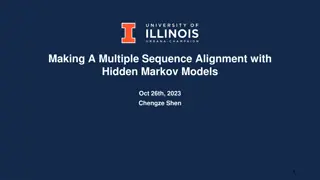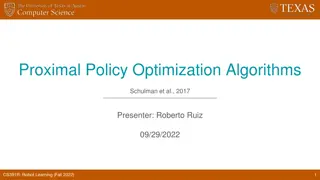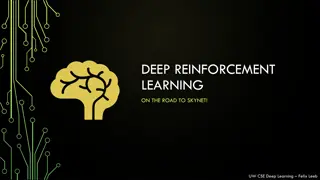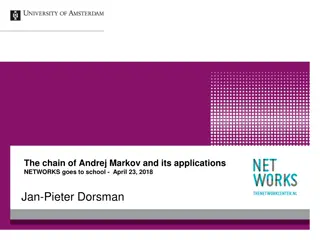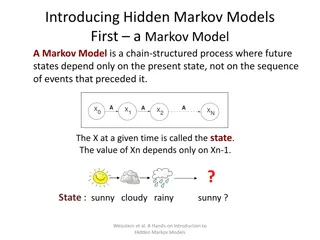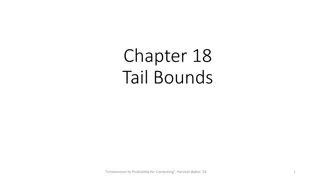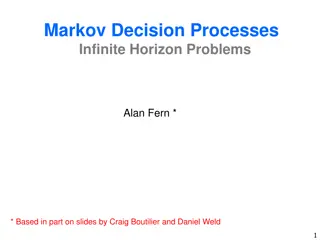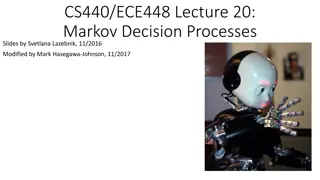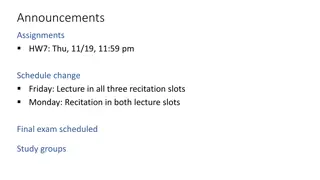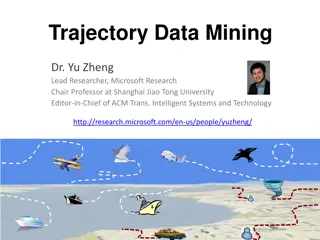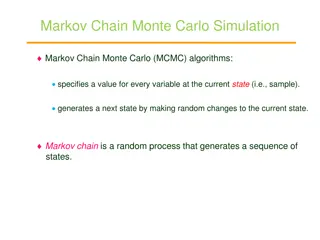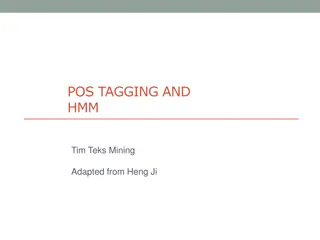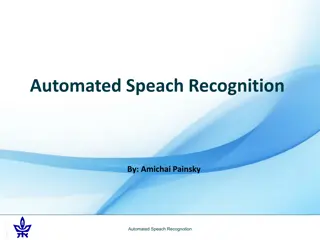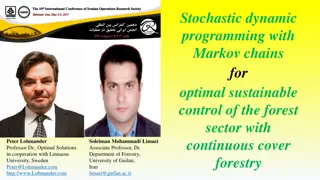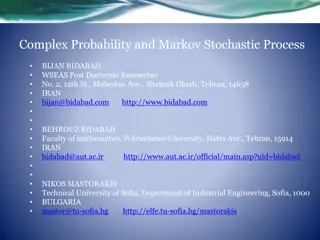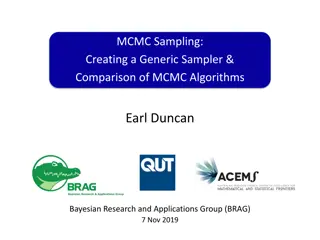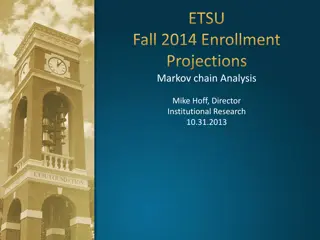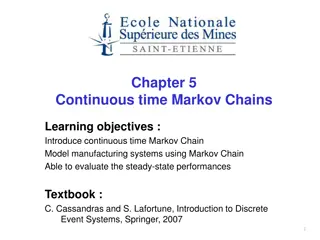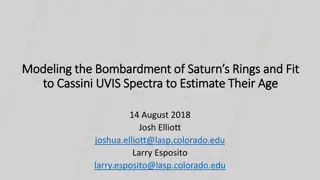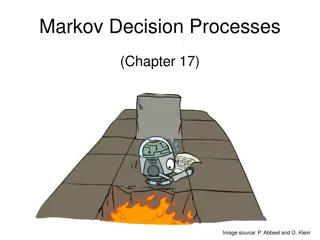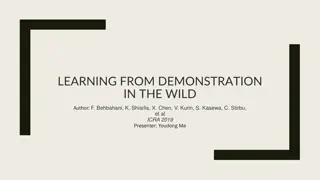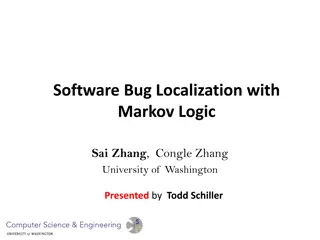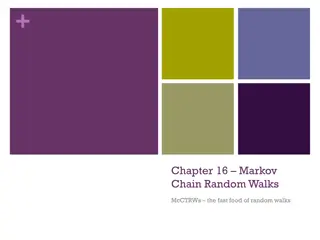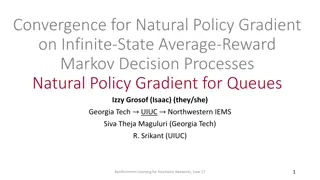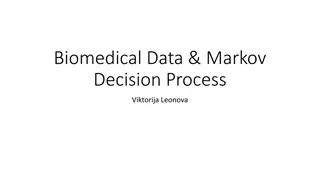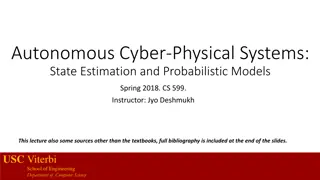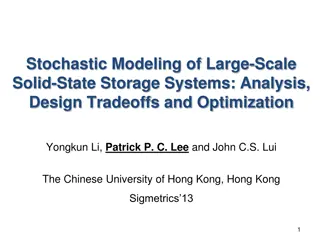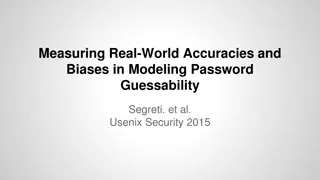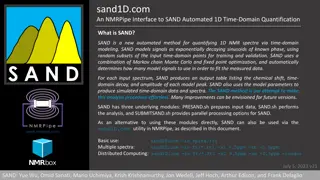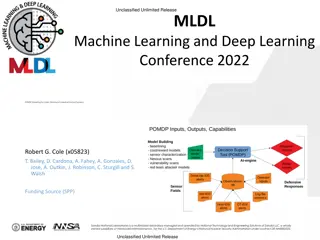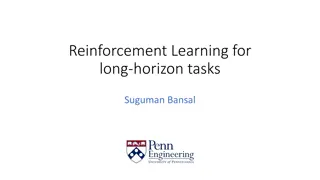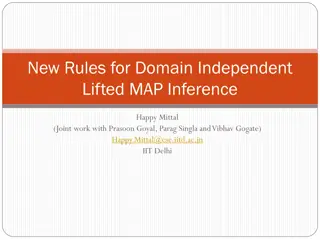Reinforcement Learning
Concepts of reinforcement learning in the context of applied machine learning, with a focus on Markov Decision Processes, Q-Learning, and example applications.
2 views • 32 slides
Understanding Multiple Sequence Alignment with Hidden Markov Models
Multiple Sequence Alignment (MSA) is essential for various biological analyses like phylogeny estimation and selection quantification. Profile Hidden Markov Models (HMMs) play a crucial role in achieving accurate alignments. This process involves aligning unaligned sequences to create alignments wit
0 views • 29 slides
Advanced Reinforcement Learning for Autonomous Robots
Cutting-edge research in the field of reinforcement learning for autonomous robots, focusing on Proximal Policy Optimization Algorithms, motivation for autonomous learning, scalability challenges, and policy gradient methods. The discussion delves into Markov Decision Processes, Actor-Critic Algorit
6 views • 26 slides
Deep Reinforcement Learning Overview and Applications
Delve into the world of deep reinforcement learning on the road to advanced AI systems like Skynet. Explore topics ranging from Markov Decision Processes to solving MDPs, value functions, and tabular solutions. Discover the paradigm of supervised, unsupervised, and reinforcement learning in various
0 views • 24 slides
Understanding Tail Bounds and Inequalities in Probability Theory
Explore concepts like Markov's Inequality, Chebyshev's Inequality, and their proofs in the context of random variables and probability distributions. Learn how to apply these bounds to analyze the tails of distributions using variance as a key parameter. Delve into examples with geometric random var
0 views • 27 slides
Understanding Markov Chains and Their Applications in Networks
Andrej Markov and his contributions to the development of Markov chains are explored, highlighting the principles, algorithms, and rules associated with these probabilistic models. The concept of a Markov chain, where transitions between states depend only on the current state, is explained using we
19 views • 21 slides
Introduction to Markov Models and Hidden Markov Models
A Markov model is a chain-structured process where future states depend only on the present state. Hidden Markov Models are Markov chains where the state is only partially observable. Explore state transition and emission probabilities in various scenarios such as weather forecasting and genetic seq
2 views • 12 slides
Understanding Tail Bounds in Probability for Computing
Tail bounds in probability theory play a crucial role in analyzing random variables and understanding the behavior of certain events. This content explores the concept of tail bounds, their importance through examples, and the derivation of upper bounds on tails. Markov's inequality is also discusse
0 views • 31 slides
Understanding Part-of-Speech Tagging in Speech and Language Processing
This chapter delves into Part-of-Speech (POS) tagging, covering rule-based and probabilistic methods like Hidden Markov Models (HMM). It discusses traditional parts of speech such as nouns, verbs, adjectives, and more. POS tagging involves assigning lexical markers to words in a collection to aid in
0 views • 92 slides
Understanding Infinite Horizon Markov Decision Processes
In the realm of Markov Decision Processes (MDPs), tackling infinite horizon problems involves defining value functions, introducing discount factors, and guaranteeing the existence of optimal policies. Computational challenges like policy evaluation and optimization are addressed through algorithms
2 views • 39 slides
Understanding Markov Decision Processes in Machine Learning
Markov Decision Processes (MDPs) involve taking actions that influence the state of the world, leading to optimal policies. Components include states, actions, transition models, reward functions, and policies. Solving MDPs requires knowing transition models and reward functions, while reinforcement
0 views • 26 slides
Introduction to Markov Decision Processes and Optimal Policies
Explore the world of Markov Decision Processes (MDPs) and optimal policies in Machine Learning. Uncover the concepts of states, actions, transition functions, rewards, and policies. Learn about the significance of Markov property in MDPs, Andrey Markov's contribution, and how to find optimal policie
0 views • 59 slides
Trajectory Data Mining and Classification Overview
Dr. Yu Zheng, a leading researcher at Microsoft Research and Shanghai Jiao Tong University, delves into the paradigm of trajectory data mining, focusing on uncertainty, trajectory patterns, classification, privacy preservation, and outlier detection. The process involves segmenting trajectories, ext
0 views • 18 slides
Understanding MCMC Algorithms and Gibbs Sampling in Markov Chain Monte Carlo Simulations
Markov Chain Monte Carlo (MCMC) algorithms play a crucial role in generating sequences of states for various applications. One popular MCMC method, Gibbs Sampling, is particularly useful for Bayesian networks, allowing the random sampling of variables based on probability distributions. This process
1 views • 7 slides
Understanding Part-of-Speech Tagging and HMM in Text Mining
Part-of-Speech (POS) tagging plays a crucial role in natural language processing by assigning lexical class markers to words. This process helps in speech synthesis, information retrieval, parsing, and machine translation. With the use of Hidden Markov Models (HMM), we can enhance the accuracy of PO
0 views • 59 slides
Understanding Automated Speech Recognition Technologies
Explore the world of Automated Speech Recognition (ASR), including setup, basics, observations, preprocessing, language modeling, acoustic modeling, and Hidden Markov Models. Learn about the process of converting speech signals into transcriptions, the importance of language modeling in ASR accuracy
0 views • 28 slides
Optimal Sustainable Control of Forest Sector with Stochastic Dynamic Programming and Markov Chains
Stochastic dynamic programming with Markov chains is used for optimal control of the forest sector, focusing on continuous cover forestry. This approach optimizes forest industry production, harvest levels, and logistic solutions based on market conditions. The method involves solving quadratic prog
0 views • 27 slides
Understanding Complex Probability and Markov Stochastic Process
Discussion on the concept of complex probability in solving real-world problems, particularly focusing on the transition probability matrix of discrete Markov chains. The paper introduces a measure more general than conventional probability, leading to the idea of complex probability. Various exampl
1 views • 10 slides
Understanding MCMC Sampling Methods in Bayesian Estimation
Bayesian statistical modeling often relies on Markov chain Monte Carlo (MCMC) methods for estimating parameters. This involves sampling from full conditional distributions, which can be complex when software limitations arise. In such cases, the need to implement custom MCMC samplers may arise, requ
0 views • 31 slides
ETSU Fall 2014 Enrollment Projections Analysis
The ETSU Fall 2014 Enrollment Projections Analysis conducted by Mike Hoff, Director of Institutional Research, utilized a Markov chain model to estimate enrollment. The goal was to reach 15,500 enrollments, with data informing college-level improvement plans. Assumptions included stable recruitment
0 views • 43 slides
Understanding Continuous-Time Markov Chains in Manufacturing Systems
Explore the world of Continuous-Time Markov Chains (CTMC) in manufacturing systems through the lens of stochastic processes and performance analysis. Learn about basic definitions, characteristics, and behaviors of CTMC, including homogeneous CTMC and Poisson arrivals. Gain insights into the memoryl
0 views • 50 slides
Modeling the Bombardment of Saturn's Rings and Age Estimation Using Cassini UVIS Spectra
Explore the modeling of Saturn's rings bombardment and aging estimation by fitting to Cassini UVIS spectra. Goals include analyzing ring pollution using a Markov-chain process, applying optical depth correction, using meteoritic mass flux values, and comparing Markov model pollution with UVIS fit to
0 views • 11 slides
Understanding Markov Chains and Applications
Markov chains are models used to describe the transition between states in a process, where the future state depends only on the current state. The concept was pioneered by Russian mathematician Andrey Markov and has applications in various fields such as weather forecasting, finance, and biology. T
1 views • 17 slides
Understanding Markov Decision Processes in Reinforcement Learning
Markov Decision Processes (MDPs) involve states, actions, transition models, reward functions, and policies to find optimal solutions. This concept is crucial in reinforcement learning, where agents interact with environments based on actions to maximize rewards. MDPs help in decision-making process
0 views • 25 slides
Learning from Demonstration in the Wild: A Novel Approach to Behavior Learning
Learning from Demonstration (LfD) is a machine learning technique that can model complex behaviors from expert trajectories. This paper introduces a new method, Video to Behavior (ViBe), that leverages unlabelled video data to learn road user behavior from real-world settings. The study presents a v
0 views • 19 slides
Software Bug Localization with Markov Logic
Software bug localization techniques like Tarantula focus on finding likely buggy code fragments in a software system by analyzing test results, code coverage, bug history, and code dependencies. The lack of an interface layer in existing techniques leads to handcrafted heuristics, posing a persiste
0 views • 17 slides
Exploring Levels of Analysis in Reinforcement Learning and Decision-Making
This content delves into various levels of analysis related to computational and algorithmic problem-solving in the context of Reinforcement Learning (RL) in the brain. It discusses how RL preferences for actions leading to favorable outcomes are resolved using Markov Decision Processes (MDPs) and m
0 views • 18 slides
Exploring Markov Chain Random Walks in McCTRWs
Delve into the realm of Markov Chain Random Walks and McCTRWs, a method invented by a postdoc in Spain, which has shown robustness in various scenarios. Discover the premise of random walk models, the concept of IID, and its importance, along with classical problems that can be analyzed using CTRW i
0 views • 48 slides
Important Updates and Inequalities in CSE.312 Summer 21 Lecture
Announcements include changes in deadlines, release of final logistics, and upcoming interviews. Markov's Inequality and Chebyshev's Inequality are discussed with practical applications like bounding distribution tails and polling probabilities. The content covers concepts of variance, probability c
0 views • 25 slides
Concentration Inequalities Overview
Dive into common concentration inequalities such as Markov's Inequality, Chebyshev's Inequality, and Chernoff's Bound. Understand the differences in their applications and ways to control variables for better accuracy in mathematical calculations. Discover additional tools like Cantelli's Inequality
0 views • 28 slides
Reinforcement Learning for Queueing Systems
Natural Policy Gradient is explored as an algorithm for optimizing Markov Decision Processes in queueing systems with unknown parameters. The challenges of unknown system dynamics and policy optimization are addressed through reinforcement learning techniques such as Actor-critic and Trust Region Po
0 views • 20 slides
Understanding Biomedical Data and Markov Decision Processes
Explore the relationship between Biomedical Data and Markov Decision Processes through the analysis of genetic regulation, regulatory motifs, and the application of Hidden Markov Models (HMM) in complex computational tasks. Learn about the environment definition, Markov property, and Markov Decision
0 views • 24 slides
State Estimation and Probabilistic Models in Autonomous Cyber-Physical Systems
Understanding state estimation in autonomous systems is crucial for determining internal states of a plant using sensors. This involves dealing with noisy measurements, employing algorithms like Kalman Filter, and refreshing knowledge on random variables and statistics. The course covers topics such
1 views • 31 slides
Optimizing Tradeoffs in Large-Scale Solid-State Storage Systems
The research delves into stochastic modeling of Solid-State Storage Systems, emphasizing design tradeoffs and optimization strategies. Key aspects covered include the workings of SSDs, challenges such as wear-out, garbage collection, and tradeoff considerations between cleaning cost and wear-levelin
0 views • 24 slides
Understanding Password Guessability Metrics in Real-World Security
Delve into the realm of password guessability metrics to enhance password security. Explore how measuring guessability aids in eliminating weak passwords, aiding users in creating stronger ones, and assessing security against various cracking algorithms. Uncover the significance of statistical and p
0 views • 27 slides
Automated Quantification of 1D NMR Spectra with SAND
SAND is an automated method for quantifying 1D NMR spectra using time-domain modeling by modeling signals as exponentially decaying sinusoids. It uses random subsets of input data for training and validation, combining Markov chain Monte Carlo and fixed-point optimization. SAND determines the number
0 views • 25 slides
Decision Support System Development for SCADA/ICS Cyber Defense
Developing a Decision Support System (DSS) powered by Partially Observable Markov Decision Processes (POMDP) to aid novice cyber defenders in protecting critical SCADA/ICS infrastructure. The system leverages Domain Expertise, AI Expert System Shell, and emulation environments for testing and valida
0 views • 7 slides
Reinforcement Learning for Long-Horizon Tasks and Markov Decision Processes
Delve into the world of reinforcement learning, where tasks are accomplished by generating policies in a Markov Decision Process (MDP) environment. Understand the concepts of MDP, transition probabilities, and generating optimal policies in unknown and known environments. Explore algorithms and tool
0 views • 11 slides
New Rules for Domain-Independent Lifted MAP Inference
In this work by Happy Mittal and team at IIT Delhi, new rules for domain-independent lifted MAP inference are introduced. The study covers motivations, notations, preliminaries, and two main rules. Markov Logic Networks (MLN) are discussed along with examples illustrating friendship, smoking habits,
0 views • 56 slides
